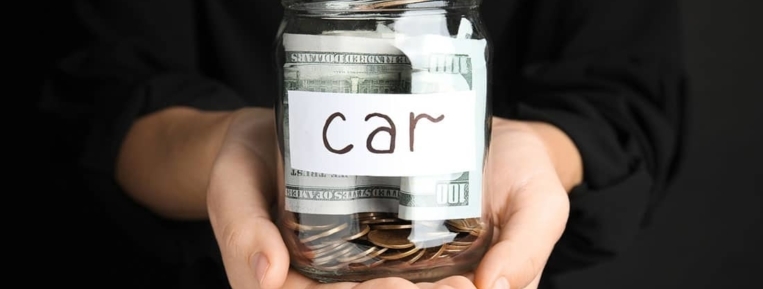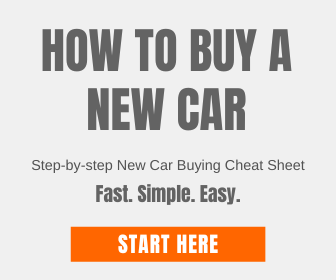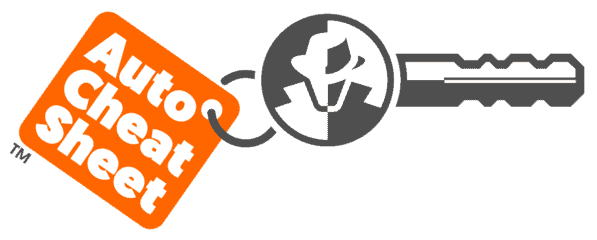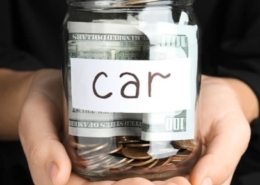How Much Money Should I Put Down When Buying a Car?
One of the most common questions I receive is, “how much money should I put down buying a new or used car?”
Ah, the age-old question: “To splurge or not to splurge?” Now, we’re not discussing that extra slice of cheesecake you’re debating about (although, I say, go for it!); we’re diving into the world of car down payments.
Car dealers advertise “$0 Money Down” or “No Money Down” to lure car buyers like yourself into dealerships across the nation. So, “Is not putting cash down when buying your next car a good idea?”
Table of Contents
- How much money should I put down on a car?
- Do you have to put money down when buying a car?
- Why down payments are important
- Factors affecting your down payment
- Pros and cons of larger down payments
- What about $0 down ads?
- The blueprint for your down payment
- Lowering your payment by extending the term
- Dealership down payment tricks
- Never pay with cash or check
- Frequently asked questions
- Final thoughts
How Much Money Should I Put Down on a Car?
When purchasing a new car, aiming for a down payment of around 15-20% of the vehicle’s purchase price is optimal. For pre-owned cars, a target of at least 10-15% is advisable.
If these figures seem steep, contribute the maximum you comfortably can, ensuring you preserve your savings and emergency reserves.
A substantial down payment enhances your financial stance post-purchase.
Nevertheless, it’s common for many buyers to opt for smaller initial payments when acquiring vehicles.
Do You Have to Put Money Down on a Car?
“Do I have to put money down when buying a car?” The answer, intriguingly, isn’t a simple yes or no.
For those with stellar credit scores and a lengthy credit history who’ve worked the numbers for monthly car payments, you may score a deal without needing any down payment. Ah, the perks of financial diligence!
But, here’s a little speed bump: if your credit history has taken a few wrong turns or you’re in the “needs improvement” zone, lenders might nudge you for at least 10% down or more of the car’s sticker price.
Going the zero-down route might seem like hitting the jackpot, but there’s a catch. Financing the entire car means paying more over time due to those pesky interest rates.
Insider Car-buying Tip: Grabbing a brand-new car without breaking the bank? It’s possible, but it can be a tad challenging. With prices often zooming past the recommended retail price, it’s wise to tap into online comparison platforms and request free new car price quotes to find the best deals near you.
And here’s a nifty trick: Even if you’re all in for the zero down-payment move, consider covering your car’s tax, title, license, and related fees upfront. Otherwise, you’ll be adding unnecessary interest to these amounts.
Remember, the financial freeway’s golden rule is simple: Borrow less, save more on interest. It’s the straight road to bigger savings!
Lastly, don’t let the dealer steer your financing if you aim to clinch that car with $0 down.
Arm yourself with a pre-approved car loan. This financial shield protects you from auto finance scams, gives insight into the interest rates you’re eligible for, and equips you with a bargaining chip when discussing financing with the dealership.
Why Down Payments Are Important
In the car ownership journey, down payments serve as the crucial first step, anchoring your financial stability and influencing the trajectory of your purchase.
The Power of Equity
You’re establishing equity in your car by placing a chunk of money down.
Imagine equity as a protective cushion. If the market value of your car dips below the amount you owe (thanks to our frenemy, depreciation), equity ensures you don’t end up owing more than your car’s worth.
So, in the world of cars, equity is like that superhero cape you always wanted as a kid.
Influence on Loan Approval and Rates
Lenders are a tad bit like your parents: they feel more comfortable when they see commitment. (skin in the game)
A substantial down payment showcases your financial commitment, increasing your chances of loan approval and fetching you better interest rates.
Who knew commitment could save you money?
Factors Affecting Your Down Payment
So, what should determine the size of your down payment?
The answer isn’t one-size-fits-all but a blend of personal finances, the car model in your sights, and the specifics of available loan terms.
Let’s explore these determining elements in detail.
Personal Financial Situation
Firstly, and most importantly, take a good look at your finances. Are they more “cha-ching” or “oh, darn”?
Your savings, monthly expenses, and other financial commitments will play a significant role in deciding the down payment you can afford.
Type of Vehicle
Are you going for a luxury model or something more economical? Your car’s type can influence the down payment.
High-end models might require a more substantial upfront payment.
Loan Terms and Conditions
Every loan is like a unique snowflake, and the terms vary. Some might offer low interest with a higher down payment, while others might be flexible.
Always read the fine print!
Pros and Cons of Larger Down Payments
Embarking on the car-buying adventure, one often wonders: Is committing more money upfront the way to go?
Let’s dissect the nuances of providing a large down payment, and it’s easy to see the advantages outnumber the disadvantages.
Benefits of a Large Down Payment:
- Enhanced Financial Flexibility: Heftier down payments pave the way for lower monthly installments.
- Favorable Interest Rates: With a more significant upfront commitment, you will likely secure better interest rates.
- Swift Ownership: It accelerates your journey towards becoming the outright owner of the vehicle.
- Savings on Interest: A substantial down payment reduces the total amount financed, leading to significant savings on interest and associated charges.
- Improved Loan Approval Chances: A lower Loan-to-Value ratio (LTV) elevates your standing in the eyes of lenders, enhancing loan approval odds.
- Demonstrated Commitment: A heftier down payment signals your earnestness, reducing perceived risk for lenders.
- Shorter Loan Tenure: You can opt for shorter loan terms by putting more down, facilitating faster loan clearance.
- Reduced Monthly Payments: The more you pay upfront, your recurring monthly car payments will be lower.
- Guard Against Negative Equity: A considerable down payment is a buffer against potential negative equity situations.
Potential Downsides:
- Strain on Immediate Savings: A more significant upfront payment might dent your immediate savings.
- Lost Investment Opportunities: The funds used for the down payment could have been invested elsewhere for higher returns.
Pro Tip: Whenever feasible, add an extra $10, $25, $50, or even more to the principal amount while making monthly car payments. This seemingly small addition can compound over time, cutting down interest charges over the loan’s lifespan and shortening your road to financial freedom.
What About the $0 Down Dealer Ads?
Car advertisements touting “$0 down” offers have significantly shifted the mindset of modern car buyers. While these zero-down deals can be tempting, they often come at a hidden price.
Dealerships and financiers promote such offers because they attract customers and rake in more via interest.
Your Cash Down Payment
15-20% of the Purchase Price
Before settling on a down payment amount, it’s essential to determine the actual new car cost to the dealer and formulate a reasonable profit-based offer for the new car. This understanding will give you a clearer perspective on the desired down payment.
Typically, setting aside 15-20% of the car’s price for the down payment is advised. This might be a stretch for some, but aiming for this range is beneficial.
A heftier down payment means you sidestep burdensome monthly payments, extended loan terms, and steep finance charges.
Plus, it safeguards you from the dreaded negative equity scenario when you decide to sell or trade-in later.
While the 15-20% mark is ideal, it’s essential not to dip below the total of your tax, title, and license fees (TT&L). Financing these fees will lead to avoidable interest charges. Even a modest down payment is preferable to none.
For those with credit hitches or first-time buyers, having a down payment in the ballpark of 15-20% can boost your appeal in the eyes of lenders catering to lousy credit or first-timers.
Saving up for a down payment before taking the car-buying plunge ensures better trade-in value in the future. Skimping on the initial payment can lead to detrimental purchasing habits that may come back to bite.
Moreover, a significant down payment can increase your chances of snagging a low-interest auto loan. While banks and credit unions are viable options, exploring online auto finance lenders might get you the most competitive interest rates.
Your Car’s Price Tag: The Blueprint for Your Down Payment
Refer to the chart below to gauge the ideal down payment based on the car’s price you’re eyeing.
Remember, these figures are guidelines to guide your savings journey:
| Vehicle Price | 15% Down | 20% Down | 25% Down |
|---|---|---|---|
| $6,000 | $900 | $1,200 | $1,500 |
| $8,000 | $1,200 | $1,600 | $2,000 |
| $10,000 | $1,500 | $2,000 | $2,500 |
| $12,000 | $1,800 | $2,400 | $3,000 |
| $14,000 | $2,100 | $2,800 | $3,500 |
| $16,000 | $2,400 | $3,200 | $4,000 |
| $18,000 | $2,700 | $3,600 | $4,500 |
| $20,000 | $3,000 | $4,000 | $5,000 |
| $25,000 | $3,750 | $5,000 | $6,250 |
| $30,000 | $4,500 | $6,000 | $7,500 |
| $35,000 | $5,250 | $7,000 | $8,750 |
| $40,000 | $6,000 | $8,000 | $10,000 |
| $50,000 | $7,500 | $10,000 | $12,500 |
To understand what fraction of the car’s price your saved down payment represents, divide your down payment by the car’s total cost.
For instance, if you’ve squirreled away $2,200 and are aiming for a $14,000 car, dividing $2,200 by $14,000 results in a 15.7% down payment.
The Down Payment Dilemma: Extending Your Term is Not the Answer
Are you considering buying a car but are short on the down payment?
A car salesperson might present a seemingly “fantastic solution” — getting you lower monthly payments without an initial down payment.
Beware of this allure! Extending your loan term is the underlying trick here. Dealers might propose stretching your loan duration by several years.
$0 Down + Lengthier Loan Term = Overpaying Big Time!
Sure, prolonging the loan period minimizes your monthly payments by spreading the total amount over a more extended span. But here’s the catch: you’ll end up shelling out significantly more in interest and additional financial charges, a detail often glossed over by eager salespersons.
I’ve witnessed customers finance cars for staggering periods like 84 or 96 months, all without a down payment. Their goal? Driving off with their dream car, irrespective of the financial ramifications. Such stretched terms, like 72 or 96 months, can lead to financial pitfalls.
If you can’t muster a down payment of at least 15-20% and find yourself needing more than 48 months of financing to make monthly payments feasible, it’s time to reevaluate. Perhaps consider a more affordable vehicle, accumulate a heftier down payment, or delay your purchase until you’re financially stable.
For illustrative purposes, let’s crunch some numbers. Imagine you’re financing a new car you’ve negotiated to $18,000. What does the picture look like with no trade-in, zero down payment, a 7% interest rate, and a 6% sales tax rate? We’ll skip any minor state-specific fees for this scenario.
| Payment over a 3 year auto loan with $0 cash down | ||
|---|---|---|
| $18,000.00 | = | Agreed upon new car purchase price. |
| $1,080.00 | + | 6% sales tax rate. |
| $2,128.86 | + | Interest over a 3 year auto loan at 7% APR. |
| $21,208.86 | = | Total of car loan payments over 3 year term. |
| $589.14/mo | = | Your monthly car loan payment. |
| Payment over a 4 year auto loan with $0 cash down | ||
|---|---|---|
| $18,000.00 | = | Agreed upon new car purchase price. |
| $1,080.00 | + | 6% sales tax rate. |
| $2,850.93 | + | Interest over a 4 year auto loan at 7% APR. |
| $21,930.93 | = | Total of car loan payments over 4 year term. |
| $456.89/mo | = | Your monthly car loan payment. |
| Payment over a 5 year auto loan with $0 cash down | ||
|---|---|---|
| $18,000.00 | = | Agreed upon new car purchase price. |
| $1,080.00 | + | 6% sales tax rate. |
| $3,588.41 | + | Interest over a 5 year auto loan at 7% APR. |
| $22,668.41 | = | Total of car loan payments over 5 year term. |
| $377.81/mo | = | Your monthly car loan payment. |
| Payment over a 3 year auto loan with $20% cash down | ||
|---|---|---|
| $18,000.00 | = | Agreed upon new car purchase price. |
| $1,080.00 | + | 6% sales tax rate. |
| $19,080.00 | = | Subtotal amount financed. |
| $3,600.00 | - | 20% down payment. |
| $15,480.00 | = | Total amount financed. |
| $1,727.19 | + | Interest over a 3 year auto loan at 7% APR. |
| $17,207.19 | = | Total of car loan payments over 3 year term. |
| $477.98/mo | = | Your monthly car loan payment. |
Opting for a shorter loan term might mean steeper monthly payments, but the savings are tangible. With a 36-month term, you’d be spending just $2,128.86 on interest, compared to a whopping $3,588.41 over 60 months. That’s a tidy sum of $1,459.55 saved!
Extending your term to 42 or 48 months might ease your monthly outflow, but the accruing interest begins to surge. This is where the allure of ads screaming “zero down offers” or “buy now, pay nothing” can derail sound financial decisions. While a zero down payment might seem tempting, it usually comes at a premium in the long run.
Beware: How Dealers Might Play Tricks with Your Down Payment
It’s not uncommon for potential car buyers to be wary of making a down payment, fearing the dealership might have ulterior motives.
But with diligent tracking of your funds, you’ll be in safe territory.
“Your Down Payment Doesn’t Influence the Sale Price of a New or Used Car.”
When to Reveal Your Down Payment Card
Hold off on revealing your down payment intentions until the purchase price of the desired vehicle is settled. If probed about it beforehand, it’s wise to state that you’re currently short on funds. Why, you ask? Dealerships aim to gauge any upfront payment to skew the numbers in their favor potentially.
Stay focused if a car sales rep mainly discusses monthly payments or uses convoluted techniques like the “four square” method. Your priority should be to establish the rock-bottom price they’re willing to part with the car for. Bring in the topic of down payments only after settling on the vehicle’s price.
Post all relevant fees (tax, title, license, etc.); the down payment should be subtracted from the settled price. Here’s a breakdown:
| How to Correctly Deduct Money Down | ||
|---|---|---|
| $18,000.00 | = | Agreed upon new car purchase price. |
| $1,080.00 | + | 6% sales tax rate. |
| $19,080.00 | = | Subtotal amount financed. |
| $3,600.00 | - | 20% down payment. |
| $15,480.00 | = | Total amount financed. |
The Art of ‘Down Payment Disappearance’
While most dealers are ethical, a few might try tactics to whisk away a chunk of your down payment. One prevalent method is by tweaking the numbers. The illustration below showcases how this seemingly simple adjustment can burden your wallet:
| How dealers steal your down payment. | ||
|---|---|---|
| $20,000.00 | = | Vehicle purchase price. (Artificially raised) |
| $1,200.00 | + | 6% sales tax rate. |
| $21,200.00 | = | Subtotal amount financed. |
| $3,600.00 | - | 20% down payment. |
| $17,600.00 | = | Total amount financed. |
In the depicted scenario, the dealer discreetly bumps the car’s price tag by $2,000, making your down payment vanish. Though this is a standard ploy, it’s not the sole one.
Having mastery over number crunching, some dealers may attempt to exploit your down payment, trade equity, or even rebates. It might seem like you’d easily catch such discrepancies, but many buyers fall prey to these tactics, especially when fixated on monthly payments or unprepared.
Stay vigilant and scrutinize every document before signing. Knowledge is power, and being prepared can save you from such pitfalls.
The Perils of Handing Over Cash or Checks to Car Dealerships
It’s a golden rule in car buying: resist the urge to hand over cash or checks as deposits or hold for a vehicle.
Sales reps may request such payments to demonstrate your earnestness to their managers, pitching it as proof of serious buying intent.
Avoid getting ensnared in this trap. Stand firm, conveying your willingness to part with money only when the final car price is mutually agreed upon.
Should you relinquish cash or a check, recovering your funds can become an uphill battle if the deal falters or unforeseen complications arise.
For utmost safety, stick to credit card transactions when dealing with car dealerships.
This provides an added layer of protection, allowing you to challenge any questionable charges with your credit card provider.
Money Down FAQs
How much is the average down payment on a car?
Lenders and financial experts typically recommend 15-20% of the car’s price with an absolute minimum of 10%.
Is zero down payment offers a scam?
Not necessarily, but always be wary of the terms associated with such offers and calculate the additional interest you may end up paying over the life of the loan.
Does a down payment affect interest rates?
Often, yes. A significant down payment shows commitment to the lender and can secure better interest rates.
Can I use a trade-in as a down payment?
Certainly! Many dealerships accept trade-ins as a form of down payment.
How does my credit score influence the down payment?
Your credit score is pivotal in determining the down payment requirement when purchasing a vehicle. A higher credit score typically signifies a good credit history and responsible financial behavior, making lenders more confident in your ability to repay the loan. As a result, if you have a strong credit score, you might qualify for favorable loan terms and even lower down payment requirements. Conversely, lenders might perceive you as a higher risk if your credit score is lower. They could ask for a larger down payment to offset this risk to secure the loan. A good credit score can give you more flexibility and negotiating power regarding down payment amounts. In contrast, a lower score might necessitate a heftier initial payment to approve the financing.
Final Thoughts About Calculating a Down Payment
Determining the perfect down payment for your car purchase is akin to finding the sweet spot between your budget, the vehicle model you’re coveting, and the financing options.
It’s essential to navigate this crossroad with financial prudence. While the temptation of zooming out of the dealership with an expensive new ride and minimal initial payment might be strong, it’s crucial to remember the bigger picture.
Long-term financial stability and the benefits of a wise down payment will far outweigh the transient excitement of a hasty purchase.
Approach your car buying journey with foresight, and let your financial health steer your decisions.
After all, the absolute joy isn’t just in acquiring the car but ensuring its ownership doesn’t become a financial burden.















